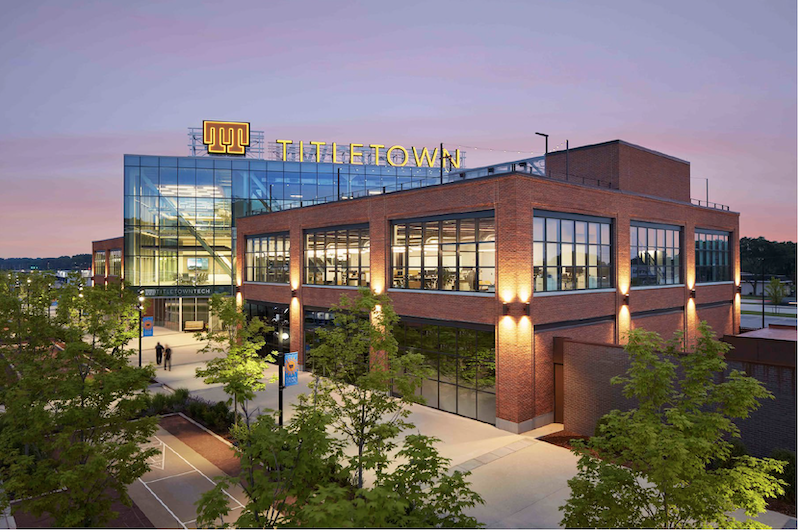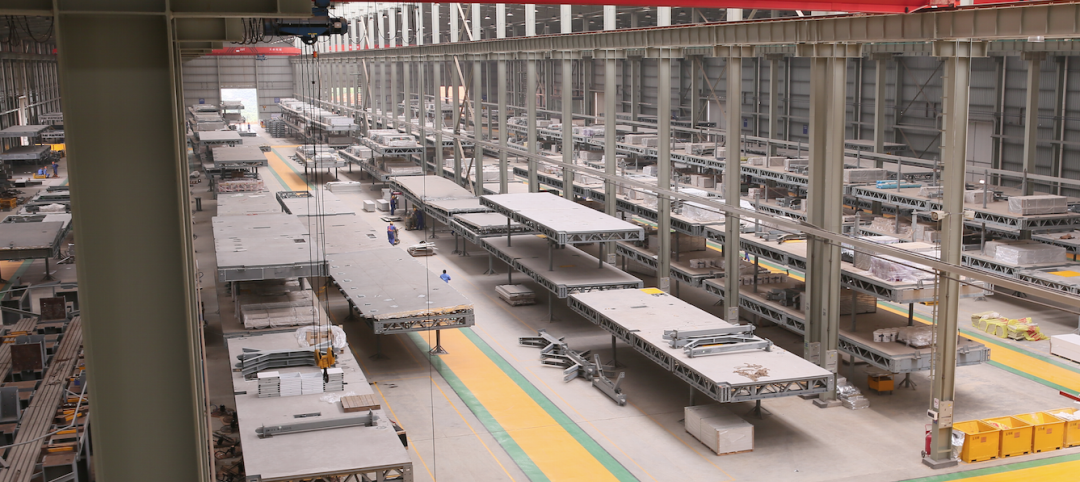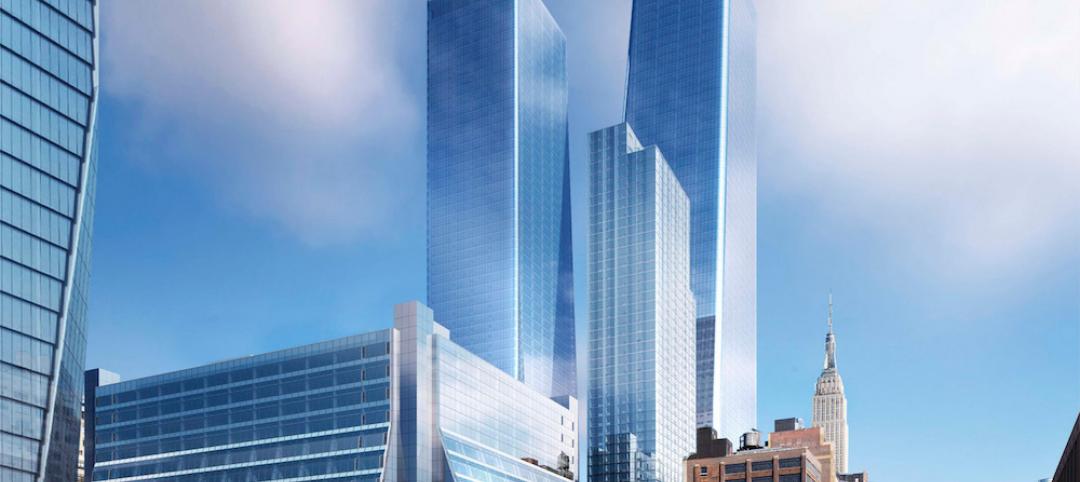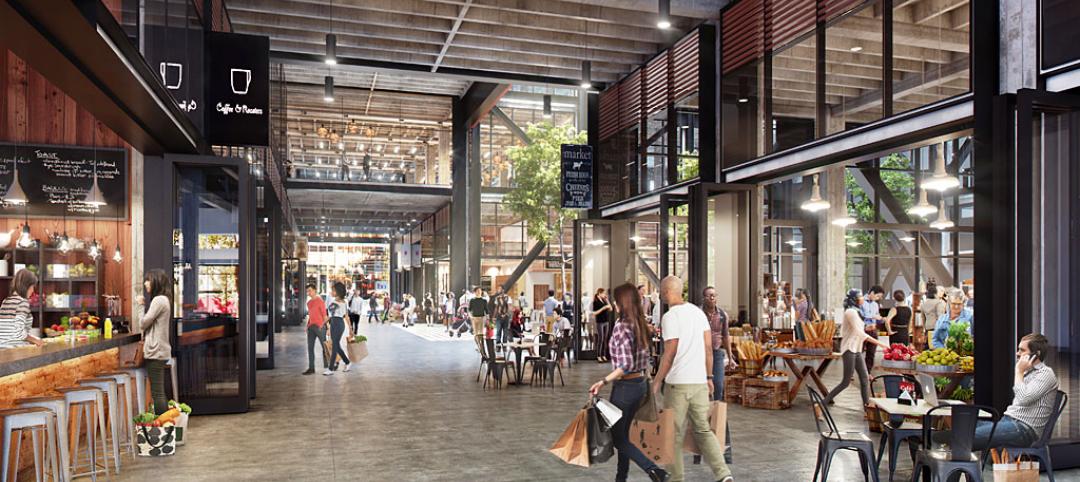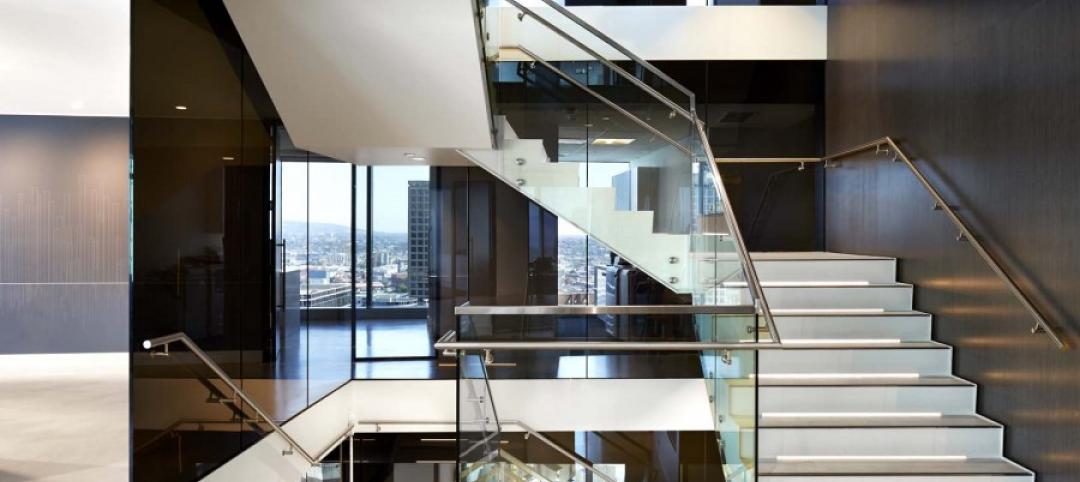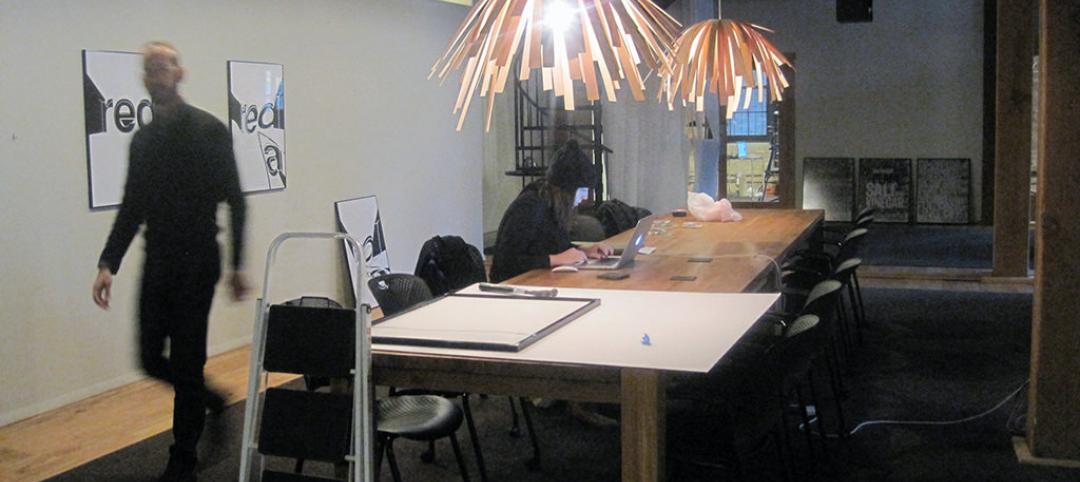Football is often described as game of strategy. So perhaps it wasn’t surprising that the Green Bay Packers, through a joint venture between the team’s development arm and Microsoft, recently opened TitletownTech, a 50,000-sf innovation center in Green Bay, Wis., that is set up to cultivate and provide financial support to high-growth startup companies.
SGA, the architect on this project, has created a three-level “stage on which innovation and collaboration can flourish,” states Brooks Slocum, the firm’s New York Studio Manager. He elaborates that the building’s design applies “spatial strategies” that “maximize” proximity, flexibility and spontaneity.
The design reflects Wisconsin’s old mill buildings, showcasing brick, steel, and wood. Those features are juxtaposed with high-tech glass and state-of-the-art materials.
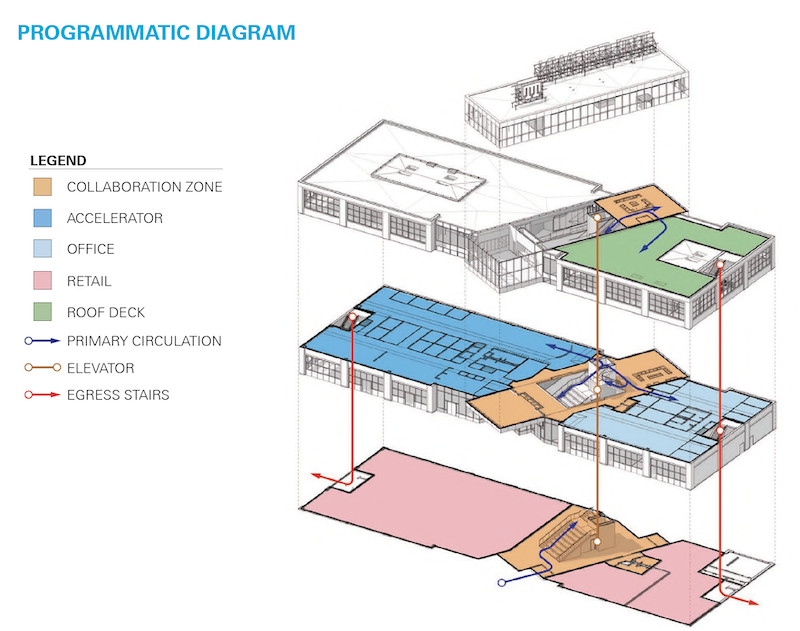
TitletownTech is designed and organized into three levels that promote user collaboration and interaction. The second floor is devoted mainly to office space.
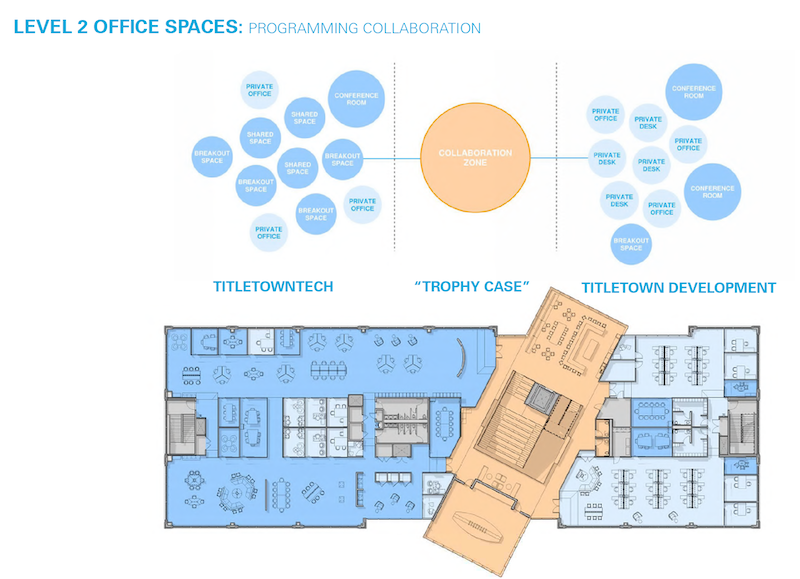
Three components drive TitletownTech, which actually has been operational since last summer but had its grand opening on October 18:
•An innovation lab, focused on creating new ventures: where entrepreneurs and established regional businesses can engage to develop ideas, explore disruptive new business models and next-generation technology solutions. The first floor includes flexible seating reminiscent of stadium bleachers. Informal lounges and social spaces are interspersed throughout the building. “Hot spots” allow guests to congregate for impromptu meetings. And “sandbox” spaces are equipped with oversized writable magnetic walls to help users flesh out ideas and discussions.
•A venture studio, focused on building ventures: where new and emerging business models and scalable industry solutions are developed into stand-alone startup ventures. Microsoft will have employees based at TitletownTech, including a Technologist in Residence, who can be resources for entrepreneurs. Microsoft’s TechSpark initiative—a civic program created to focus on communities in six states that include Wisconsin—will also have a representative on site. (Microsoft’s agenda at TitletownTech includes its goal to eliminate the rural broadband gap for millions of Americans.)
•A venture fund, focused on funding and investing in high-growth startups aligned with industries in Northeastern Wisconsin that will bring opportunity to the region. As of last October, the venture fund had $25 million, and its limited partners include AmeriLux International, Baird, Cornerstone Foundation of Northeastern Wisconsin, Dickman Ventures, Green Bay Packaging, N.E.W. Venture Foundry, Plexus, Schreiber, Schneider, Sartori Cheese, The Village Companies and Weyers Investments, Delaware North, New York Mets and Sterling Project Development.
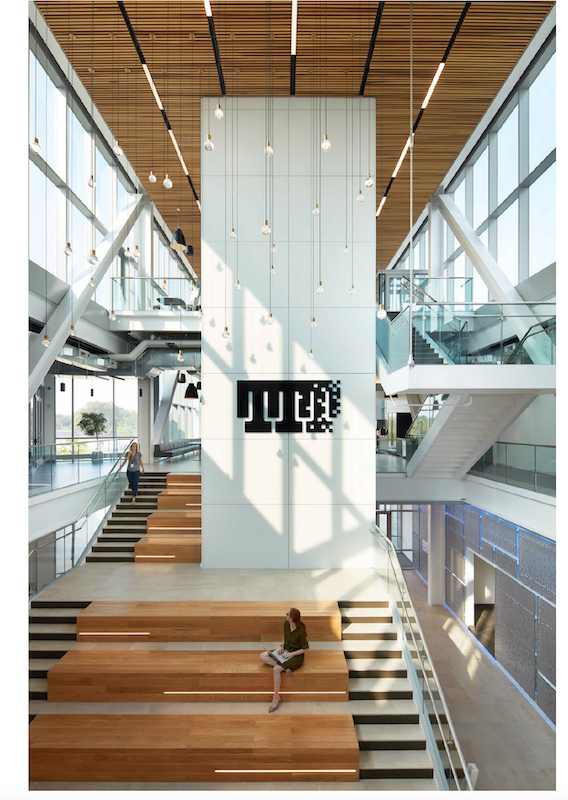
The first floor of an expansive atrium features flexible seating that suggest stadium bleachers, and encourages people to interact as that move from level to level.
TitletownTech is integrated into the Packers’ 45-acre Titletown District, located west of the team’s Lambeau Field stadium. The District’s 20-acre first phase, completed in 2017, includes a hotel, retail, restaurants, and sports medicine center. Phase 2, whose construction began last June, focuses on residential and commercial buildings, including at least 54 townhouses under constuction, as well as a five-story office building, and 152-unit apartment building. So far, the Packers have invested $170 million in its Titletown District.
“Northeastern Wisconsin has a burgeoning entrepreneurial ecosystem, and we felt Titletown would be a perfect place to further spur economic expansion in the region and beyond by bringing world-class digital innovations and expertise to Greater Green Bay,” explains Aaron Popkey, a spokesman for the Green Bay Packers. He goes on to say that TitletownTech will serve as a creative center where digital solutions are developed for key market challenges.
TitletownTech is already working with a handful of companies that include Oculogica, a digital healthcare firm that has developed the EyeBOX, the first FDA-approved neuro-diagnostic device that uses proprietary and innovative technology to track eye novement to determine if a person has a concussion (a tool that might benefit the football team directly).
Through BIM coordination, SGA and Miron Construction, TitletownTech’s CM, reduced the innovation center’s construction costs by between 1.5% and 3%. Utilizing Enscape software’s real-time rendering capabilities, SGA’s models represented the actual materials, design intent, specifications, detailing, and coordination. The models helped to identify, for example, that structural beam openings were too small, and that a large fan in the building’s atrium needed a framing system and mounting points.
Preconstruction visualization for the innovation center, offices, and boardroom also provided scheduling savings. And the team was able to spot MEP/FP clashes and re-route systems in a 3D clash-protection process.
Editor's note: Some information about Titletown Tech, and comments from Green Bay Packer spokesman Aaron Popkey, were added after the initial posting of this article.
Related Stories
Game Changers | Feb 4, 2016
GAME CHANGERS: 6 projects that rewrite the rules of commercial design and construction
BD+C’s inaugural Game Changers report highlights today’s pacesetting projects, from a prefab high-rise in China to a breakthrough research lab in the Midwest.
Mixed-Use | Jan 25, 2016
SOM unveils renderings of dual-tower Manhattan West development
The five million-sf project includes two office towers, a residential tower, retail space, and a new public square.
Office Buildings | Jan 21, 2016
Nike reveals design, first images of planned 3.2 million-sf expansion to its world headquarters
The expansion looks to combine design elements inspired by human movement, speed, and the strength and energy of competition.
| Jan 14, 2016
How to succeed with EIFS: exterior insulation and finish systems
This AIA CES Discovery course discusses the six elements of an EIFS wall assembly; common EIFS failures and how to prevent them; and EIFS and sustainability.
Office Buildings | Jan 14, 2016
JLL: Slowdown not expected for office market
The booming sector had an occupancy growth rate 1.3 times that of new supply in the fourth quarter of 2015.
Office Buildings | Jan 11, 2016
Spec for tech: Designing for the creative class
The new work environment, settings which blur the line between work and life, is inspired by cities and the attributes that all great urban environments share, writes Ben Tranel of Gensler.
Office Buildings | Jan 6, 2016
4 tips for creating flow in a multi-level workspace
Successful workplaces enable a clear progression of ideas and people, which can be challenging for workplaces that occupy multiple levels. Perkins+Will's Sarah Stanford found some strategies that have proven successful.
Office Buildings | Dec 23, 2015
Good design alone won’t eradicate mindless meetings
Gensler's Johnathan Sandler discusses efficient alternatives to dull, wasteful workplace meetings.
Office Buildings | Dec 17, 2015
John Buck Company to develop CNA’s Chicago headquarters
The 35-story building will have plenty of column-free space.
Office Buildings | Dec 9, 2015
HOK collaborates with IFMA on new workplace strategy research report
Report cites work-life balance as the top reason for implementing “distributed work” strategies.


